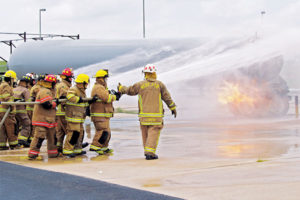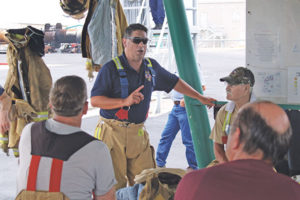Know your first responders
On the morning of April 11, 2010, the mayor of Tempe, Arizona, Hugh Hallman, praised the safety professionals participating in two days of classroom and hands-on live fire training.

Propane pros and first responders participate in live fire training at an industry responder conference. Photo by Larry Dombrowski/Logica 3
Two hundred propane and firefighter professionals gathered to learn from one another on how to safely respond to a propane incident. Many of the firefighters never had specific training responding to a propane emergency. Many propane professionals never interacted with their local first responders to discuss propane emergencies.
This issue was the impetus behind the industry responder conferences I created and managed – an opportunity for those involved in propane incidents to understand one another’s respective skills, knowledge, constraints and languages.
“We all speak English, but when we start throwing our own acronyms around, things can get confusing,” said Dennis Cruise, president of Propane Training Services, at one of the conferences. “And that confusion can result in lost time and sometimes increased injuries and property damage.”
A panel of propane and firefighter professionals discussed some of the tensions that can arise at the scene when responders and propane professionals don’t know one another.
A propane pro lamented that he was not allowed to enter an incident scene to help firefighters.
“These firefighters knew nothing about propane, and I was just trying to help,” said one propane panelist.
A firefighter recalled when his incident commander ignored the advice of a propane guy, who became angry. The problem was they had never met.
Emergency example
Let’s illustrate the importance of first responder outreach. Here’s the setup:

Mark Holloway, AmeriGas safety manager and former volunteer fire chief, engaged first responders and LPG pros prior to a live fire training that took place June 2012. Photo by Larry Dombrowski/Logica 3
It’s Friday, 1 p.m., just outside Denver. A propane bobtail flips over. No one is injured. There’s a very small leak of liquid propane, the origin of which is unknown. The road has been closed, and rush-hour traffic is approaching. The overturned bobtail prominently displays the company name.
Scenario 1: You are the propane professional called to the scene by your supervisor. You have never reached out to any local firefighters. You approach the incident commander, introduce yourself and tell him that you think a valve likely was damaged and, with the proper equipment and precautions, the bobtail could be off the road in a couple of hours.
The incident commander who has never met you may be thinking, “Heck, I retire with full pension in a couple of years. There’s no way I’m listening to this guy.” Instead, he orders personnel to flare off the contents in the bobtail, which takes about six to eight hours.
Rush-hour traffic is jammed for miles, and that overhead news chopper is telling its listeners about the company for which they have to thank.
Scenario 2: Same as above except the dispatched propane professional had built relationships with the local fire department for years, provided training and plant tours, and discussed “what-if” scenarios.
You approach the incident commander, shake hands and explain what happened. You then assess the situation and tell him that the leak appears to be from a damaged valve. He has been trained to set the bobtail upright and to control the leak. The remaining propane is to be pumped into another bobtail after rush-hour traffic has passed.
Please note the above is a simplification of what happens during an actual propane emergency. I use these scenarios simply to illustrate the value of building relationships with your local first responders.
So please, make it a point to reach out to your local first responders before an incident. You will be glad you did.
Stuart Flatow spent 18 years as the Propane Education & Research Council’s vice president for safety and training before stepping down in February 2019. He can be reached by emailing sflatow@aol.com.
NOTE: The opinions and viewpoints expressed herein are solely the author’s and should in no way be interpreted as those of LP Gas magazine or any of its staff members.
















